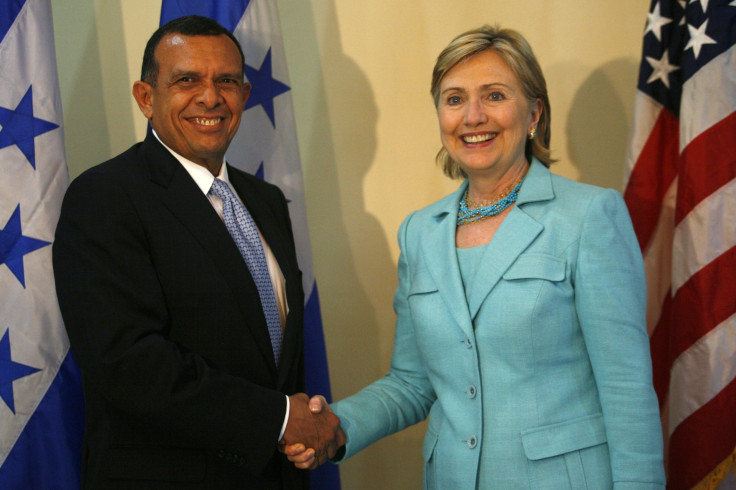
Hillary Clinton’s Director of Hispanic Media Jorge Silva had to issue a strange statement on Wednesday, dismissing reports that his boss helped smooth over an armed overthrow of the president of Honduras in 2009. Criticism of Clinton’s role in the Honduras shortly after the coup d’état as Secretary of State proliferated after the release of her book, Hard Choices, and again after many of her emails were released by the Department of State. The Nation raised the issue again last week after the murder of Berta Cáceres.
The article said that Clinton’s support of the government that kidnapped former President José Manuel Zelaya Rosales and forced him out of the country led to a deterioration of women’s and LGBT rights in the country. The Nation also implied that Clinton’s actions may have indirectly contributed to the activist’s death.
“That charge is simply nonsense,” Silva wrote in an email to Latino USA. “Hillary Clinton engaged in active diplomacy that resolved a constitutional crisis and paved the way for legitimate democratic elections.”
Cáceres and her allies were closely aligned with Zelaya, who was ousted from power in an armed conflict in 2009 that the State Department recognized as an illegitimate coup.
Then Secretary of State, Hillary Clinton suggested a backchannel to Roberto Micheletti (the de facto President after the coup) through a former Bill Clinton impeachment lawyer named Larry Davis. At the time, he represented a consortium of Honduran oligarchs. It’s unclear how much influence, if any, Davis had on the final agreement, backed by Clinton, which ultimately allowed an opposition congress to legally keep Zelaya out of power for good.
“They did nothing to help [....] congress was hemming and hawing. The State Department didn’t even know what to say, and they weren’t even called out on it. It was a shameful exhibition by the U.S. government,” Silvio Carrillo, a journalist and Cacares’ nephew told Democracy Now last week.
Why does Clinton’s role in the 2009 Honduran political crisis matter? Two reasons.
First, and most obvious, Clinton is running for president. Voters need to evaluate her performance as Secretary of State. Maybe she legitimized a coup, maybe she resolved a crisis.
The second answer is less obvious: Hillary Clinton may be able to save a man’s life. The lone witness in the attack, Mexican activist Gustavo Castro Soto, fears another assassination attempt. He is not a suspect in the case, and he has reportedly given days worth of testimony about the incident. However, Honduran officials have prevented him from leaving the country.
What Can Clinton Do Now?
The coup, in a sense, has not ended. Loyalists who backed the insurrection still reportedly sit in top ministries. The assassination attempt that killed Berta Cáceres’ hasn’t ended either, in a sense. Berta Cáceres’ surviving friends and family firmly believe that the State Department turned a blind eye to the 2009 coup, and helped keep it in motion through back channels like Davis.
Fellow environmental activist Jeff Conant think that same power could be used now, to leverage protection for Gustavo. Conant, an International Forests Campaigner with Friends of the Earth, nominated Cáceres for a prominent environmental fellowship that she one in 2015, cementing her status as an international leader. He’s critical of the State Department’s role in the 2009 coup, but believes that they could act now to leverage Honduran leaders to release Gustavo.
“We know that the State Department has deep ties in Honduras,” he told the Latin Times. “Clinton tacitly supported the 2009 coup in Honduras [...] which is why we think that it's incumbent on the State Department to take every possible action and ensure a credible investigation.”
Could Clinton save Gustavo with a call to Davis? Could the State Department call of the assassins that his friends say are stalking him?
So far, the State Department has not been eager to speak about Berta or Gustavo. A department spokesperson dodged or delayed questions by reporters in at least two separate briefings, and released a short statement two days after Berta’s death.
“The United States condemns the murder of civil society activist Berta Caceres and calls upon the Honduran government to conduct a prompt, thorough, and transparent investigation and to ensure those responsible are brought to justice,” said spokesperson John Kirby. “We offer our sincere condolences to her family, friends, and the people of Honduras, who have lost a dedicated defender of the environment and of human rights.”
© 2025 Latin Times. All rights reserved. Do not reproduce without permission.




